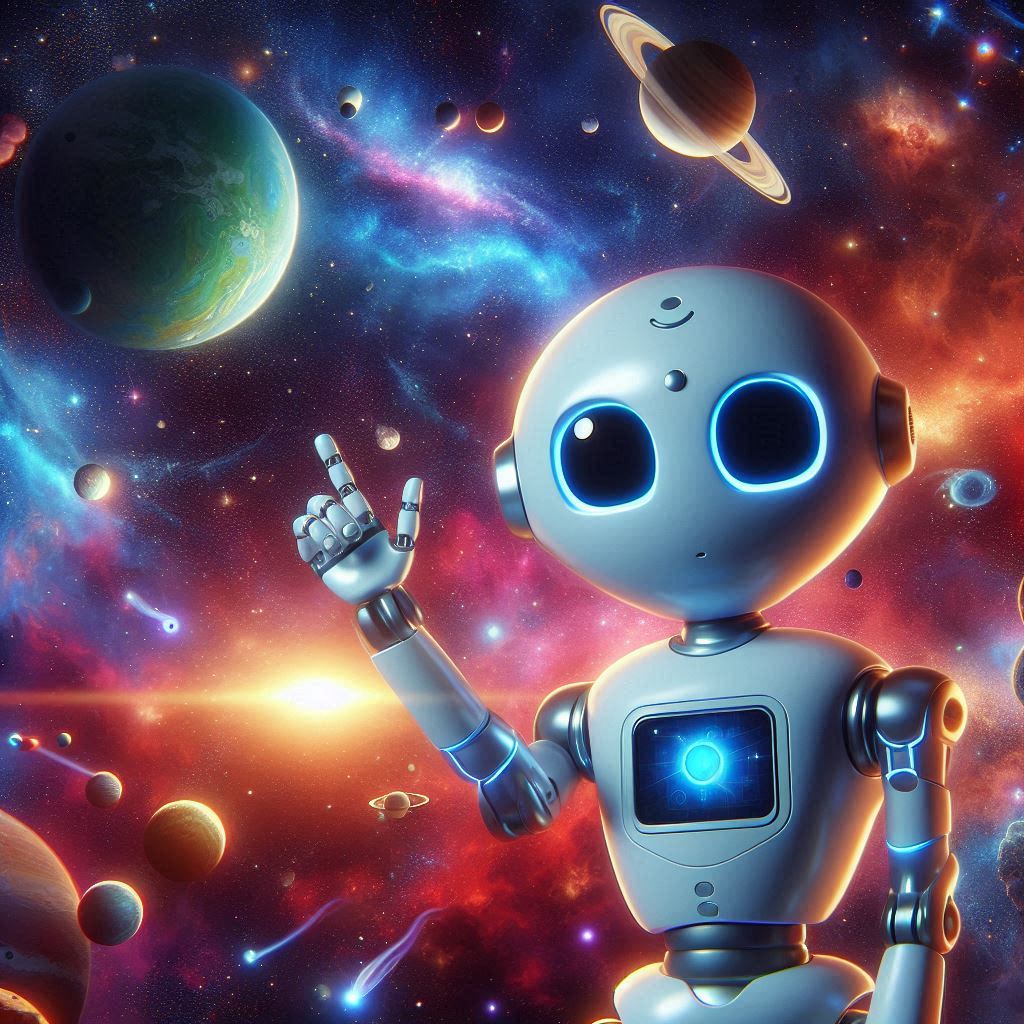AI in Space Exploration: AI’s Role in Advancing Space Exploration Missions
AI is revolutionizing space exploration, making missions more efficient, enhancing safety, and unlocking new possibilities for human space travel. This transformative technology is being leveraged by space agencies and companies worldwide to push the boundaries of what we can achieve in space.
United States
NASA: NASA is at the forefront of integrating AI into space missions. AI is instrumental in planning future Mars missions, analyzing data from previous missions, and developing models of the Martian environment. AI also helps in optimizing trajectories, selecting landing sites, and ensuring the safety of astronauts.
European Space Agency (ESA)
ESA: The European Space Agency leverages AI for various aspects of space exploration. The ExoMars rover uses AI to navigate the Martian surface, identify objects, and direct exploration efforts. AI algorithms analyze data from satellites to monitor climate change and predict natural disasters.
China National Space Administration (CNSA)
CNSA: China is making significant advancements in space exploration with AI. The country is developing autonomous navigation systems and AI-driven data analysis tools to support its ambitious space missions. AI is also being used in the design of more efficient rocket engines and propulsion systems.
Indian Space Research Organisation (ISRO)
ISRO: India’s ISRO has successfully integrated AI into its missions, such as the Chandrayaan-3 lunar mission. AI plays a crucial role in navigation, selecting landing sites, and analyzing satellite data for applications like disaster forecasting and crop yield prediction.
Australian Space Agency: Australia is embracing AI in its space sector. AI robots like “Henry the Helper,” developed by Australian companies, assist astronauts both technically and emotionally. These AI-driven robots are expected to play a vital role in future missions to the Moon and Mars.
New Zealand Space Agency: New Zealand has become a spacefaring nation with its locally built rockets. AI-assisted tools are being developed to revolutionize astronaut selection and enhance clinical decision-making, improving health monitoring and performance assessment for astronauts.
Important Tools and Techniques
- Machine Learning: Essential for analyzing vast amounts of data from space missions, identifying patterns, and predicting outcomes. Machine learning algorithms enhance the accuracy of data analysis and decision-making processes.
- Computer Vision: Crucial for navigation, obstacle avoidance, and surface mapping. Computer vision technology enables rovers and spacecraft to interpret visual data and make autonomous decisions.
- Natural Language Processing (NLP): Facilitates communication between astronauts and AI systems. NLP allows AI to understand and respond to human language, making interactions more intuitive and effective.
- Autonomous Navigation Systems: Enable spacecraft and rovers to navigate and avoid obstacles without human intervention. These systems use AI algorithms to process real-time data and make decisions autonomously.
- Quantum Accelerometers: Provide highly accurate positioning for space exploration vehicles. These AI-powered devices do not rely on traditional references like stars, making them ideal for deep space missions.
Science and Techniques
- Data Analysis: AI analyzes large amounts of data from space missions, helping scientists understand planetary environments and identify potential resources. AI-driven data analysis is critical for making informed decisions during missions.
- Mission Planning: AI optimizes mission planning by determining the best trajectories, landing methods, and resource utilization strategies. This reduces risks and ensures mission success.
- Robotics: AI-controlled robots perform tasks that are too dangerous or complex for humans. These robots explore planetary surfaces, collect samples, and conduct scientific experiments.
- Predictive Maintenance: AI algorithms analyze data from spacecraft systems to predict potential failures and recommend maintenance. This ensures the reliability and longevity of space missions.
- Real-Time Decision Making: AI systems make real-time decisions during missions, such as changing course or performing emergency maneuvers, ensuring the safety and efficiency of space exploration activities.
Latest Breakthroughs in AI and Space Exploration
One of the latest breakthroughs in AI space exploration is the development of quantum accelerometers. Companies like Advanced Navigation in Australia are at the forefront of this innovation. These AI powered devices provide highly accurate positioning for space exploration vehicles without relying on traditional references like stars, offering a significant advantage for deep space missions.
Real-Time Applications of AI in Space Exploration
- Autonomous Navigation: AI systems enable spacecraft to navigate autonomously, making real-time decisions without waiting for instructions from Earth.
- Predictive Maintenance: AI algorithms analyze data from spacecraft systems to predict potential failures and recommend maintenance, ensuring the reliability and longevity of space missions.
- Rover Operations: AI driven rovers on planets like Mars can analyze their surroundings, make independent decisions, and perform complex tasks such as sample collection and environmental analysis.
- Astronaut Support: AI assistants provide astronauts with technical support, monitoring vital signs, managing schedules, and offering solutions to problems in real-time.
Future Trends in AI-Driven Space Exploration
The next 5 to 10 years promise even more exciting developments in AI-driven space exploration:
- Enhanced Mission Planning: AI will play a crucial role in planning and simulating space missions, optimizing routes, and ensuring mission objectives are met efficiently.
- Advanced Space Habitats: AI will be integral in designing and maintaining advanced habitats on the Moon, Mars, and beyond, ensuring the well-being of astronauts.
- Interplanetary Exploration: AI-powered spacecraft will explore distant planets and moons, analyzing their environments and searching for signs of life.
- Improved Communication: AI will enhance communication between Earth and spacecraft, enabling faster and more reliable data transmission.
- Deep Space Navigation: AI will provide precise navigation for spacecraft venturing into deep space, ensuring they reach their destinations safely and accurately.
Preparing for a Future in AI and Space Exploration
To stay ahead in this rapidly evolving field, individuals can pursue studies in areas such as:
- Machine Learning and AI: Understanding the fundamentals of AI and machine learning is crucial for developing intelligent systems for space exploration.
- Robotics: Knowledge of robotics is essential for designing and managing autonomous rovers and robotic assistants.
- Data Science: Skills in data analysis are important for interpreting the vast amounts of data generated by space missions.
- Aerospace Engineering: A strong foundation in aerospace engineering is vital for understanding the challenges and opportunities in space exploration.
- Astrobiology: Studying the potential for life beyond Earth can guide AI-driven searches for extraterrestrial life.
AI is undeniably transforming space exploration, making missions more efficient, safer, and opening up new possibilities for human space travel. The advancements made by countries like India, Australia, New Zealand, and China showcase the global momentum behind AI in space, promising a future where intelligent systems play a pivotal role in our quest to explore the cosmos.
Future Prospects
The future of AI in space exploration looks incredibly promising. In the next 5 to 10 years, we can expect:
- Enhanced Mission Planning: AI will play a critical role in planning and simulating space missions, optimizing routes, and ensuring mission objectives are met efficiently.
- Advanced Space Habitats: AI will be integral in designing and maintaining advanced habitats on the Moon, Mars, and beyond, ensuring the well-being of astronauts.
- Interplanetary Exploration: AI-powered spacecraft will explore distant planets and moons, analyzing their environments and searching for signs of life.
- Improved Communication: AI will enhance communication between Earth and spacecraft, enabling faster and more reliable data transmission.
- Deep Space Navigation: AI will provide precise navigation for spacecraft venturing into deep space, ensuring they reach their destinations safely and accurately.
By embracing these advancements, space agencies and companies worldwide are paving the way for a new era of space exploration, where AI plays a pivotal role in pushing the boundaries of what we can achieve in the cosmos.

